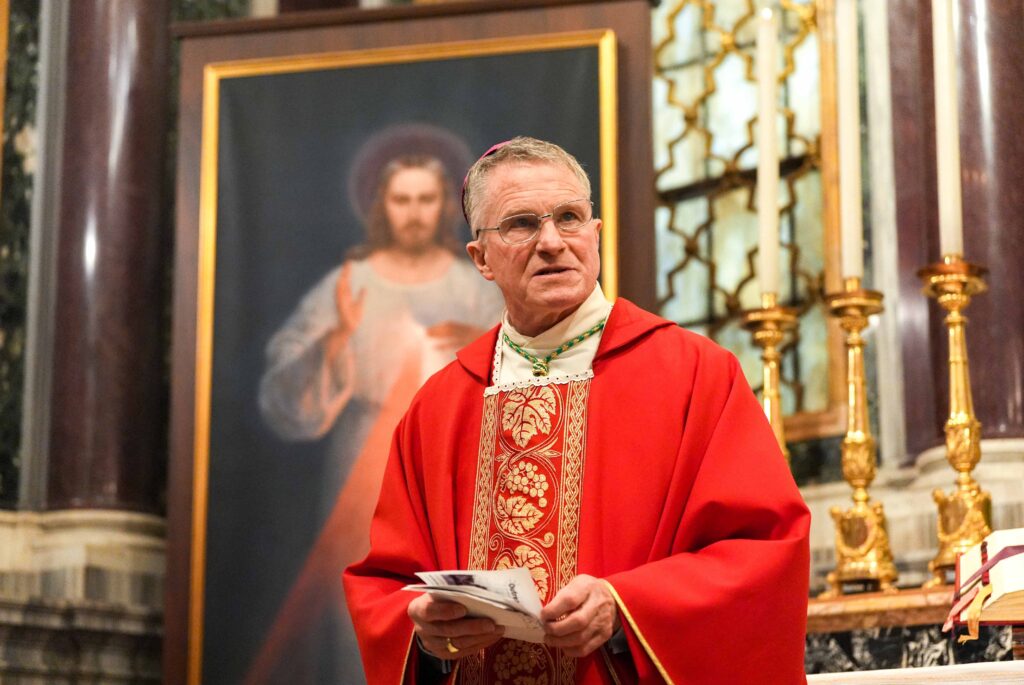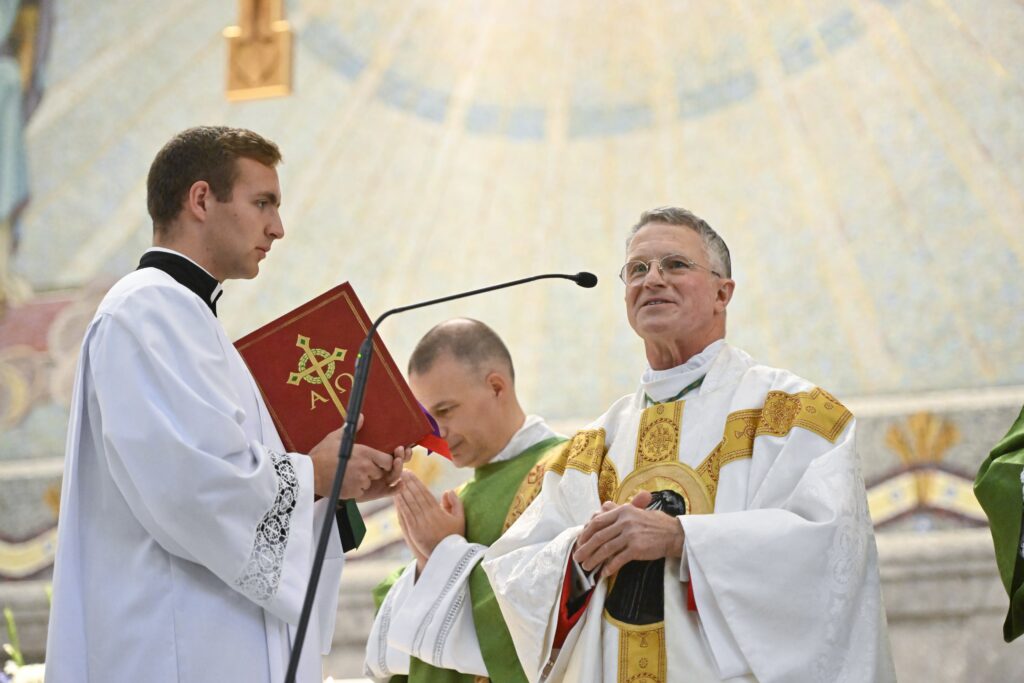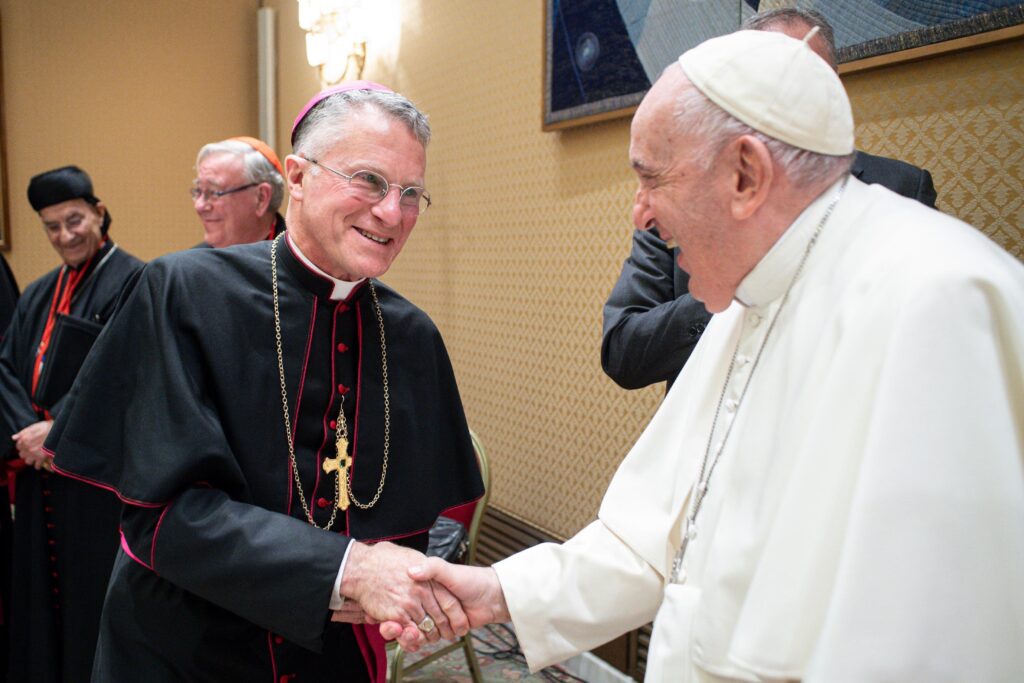BALTIMORE (OSV News) — For the past three years, Archbishop Timothy P. Broglio of the U.S. Archdiocese for the Military Services has been the U.S. bishops’ top man while also running an archdiocese that encompasses the entire world.
The outgoing president of the U.S. Conference of Catholic Bishops has governed the conference during a National Eucharistic Revival, which included a National Eucharistic Congress, during a national immigration crackdown, and during the election of the first American pope.
OSV News, which interviewed Archbishop Broglio every fall during his presidential tenure, sat down with him one last time Nov. 12 before he exited the role officially at the conclusion of the U.S. Catholic bishops’ Nov. 10-13 plenary assembly.
This interview has been edited for length and clarity.
OSV News: What are some of the biggest challenges you faced in your tenure?
Archbishop Broglio: Probably the overwhelming challenge, which I think would be true of any president of the conference, is just trying to find the right balance between conference responsibilities and your diocesan responsibilities. And, of course, with mine being a diocese that covers the world, that made it a little more challenging. But that was compensated by the fact that when I am at the Pastoral Center (for the U.S. Archdiocese for Military Services), I’m in Washington, D.C., actually within walking distance of the (USCCB) headquarters. So, in one sense, it’s one problem not everyone would have, but also with an advantage that not everyone has. I would say another challenge has just been the ability to communicate and get the message out effectively, because while the bishops are very much united, I think our society is very polarized and so that makes it difficult to — well, I suppose it has always been difficult to preach the Gospel — but it makes it difficult to preach it effectively and in a way that the people are open to hearing it. So that’s been a challenge.
OSV News: Cardinal Francis George, formerly of Chicago, who was your predecessor for the term from 2007 to 2010, remarked that one of the primary duties of the presidency is to “see to it that the bishops stay together.” That might sound easy enough — and you expressed in your final presidential address that you felt that (duty) — but what has that reality been like for you?
Archbishop Broglio: I found a tremendous amount of support among the bishops — especially when you ask them to do things, to assume responsibilities, to work on a task force or something like that — a tremendous, tremendous willingness, tremendous eagerness to support the work of the conference. It’s perhaps been more of a mission to manifest and explain that we are united, because there is a tendency to think that we’re not; and this is particularly true sometimes outside the boundaries of the United States, because of the way things are reported or seem to be manifested to the view of people who are outside the episcopal college. I would agree with Cardinal George, that is a primary responsibility. I would say that’s probably been one of the easier things, because the bishops were so united and so supportive.

OSV News: After you’ve lived it, how would you define the role of president of this conference?
Archbishop Broglio: You have to explain to the lay faithful what you’re not. I’m not the superior of the bishops. I’m not the president of a corporation. I’m not the arbiter of all things Catholic. On the contrary, I’m charged with directing the duties of the episcopal conference, which are very well defined in canon law. And there are very specific areas in which the conference works: It has a unified body, and has a spokesperson for the conference of bishops. Those are things that you do assume. I think, too, there’s a role in fostering relations with the national government — that’s certainly a responsibility — on a lower level than the presidency. There is a fair amount of openness and a fair amount of ability. I was never able to meet with the president of the United States. Neither with President Biden nor with President Trump.
OSV News: Had you sought out interviews?
Archbishop Broglio: Oh yes. As did my predecessor. It just didn’t happen.
OSV News: After three years as president, what would you say needs to change about the way the conference does business?
Archbishop Broglio: One of the things that we are trying to do now, as we move forward, is to ask what the bishops would like the conference to do. We don’t set goals exactly the same way as we used to. But one of the things that we have to decide — and I’m glad it will no longer be my responsibility — what to do with the (USCCB headquarters) building, because it is much, much larger than we need it to be.

OSV News: Many significant moments have happened in the life of the church during your tenure, such as the National Eucharistic Congress, the Jubilee Year, the election of the first American-born pope. What moment or moments stand out to you as highlights of the last three years?
Archbishop Broglio: A number of them. I mentioned one yesterday, which was my visit to Ukraine a month after I was elected president. That was very moving. And it was certainly interpreted by the Ukrainians as a gesture by the president of the episcopal conference. I think that was a very important moment of solidarity of the church in the United States with the church in Ukraine. For me that was very significant.
I think also participating in the synod. Shortly after I was elected, we had a meeting of the representatives of the continents, so I was able to meet Pope Francis about a month or so after I was elected. That was also quite unique. In fact, I remember I went from Thanksgiving with my brother and his family to Rome for that meeting. So that was certainly very significant.
Participating in the Eucharistic Congress was a tremendous moment of manifestation of faith, really the culmination of some years of Eucharistic revival. I thought it was amusing, because I was the only bishop who actually raised a question when we proposed a Eucharistic Congress, as to why it was going to cost as much money as it was going to cost. I thought it was somewhat interesting that I was the president of the conference when it took place. I will say, though, to the credit of the group that organized the Eucharistic Congress, they did cut the budget considerably and spent much less money than had been anticipated. And despite the fact that I lived in Rome for 19 years of my life, this was the first time I ever participated in the funeral of a pope. Celebrating Pope Francis’ funeral, even though I could barely see the altar, was quite a moving, moving moment. And meeting the new Holy Father was also something unique, and happened much more quickly than it would have had I not been president of the conference.

OSV News: Speaking of Pope Leo, for the first time we have an American pope. What is the opportunity for the church in the United States at this moment?
Archbishop Broglio: I think I would classify that opportunity as a responsibility, because the pope was born in the United States but most of his ministry as a priest was not spent in the United States, which very much affects how he ministers, and how he views things. However, I think that, in a certain sense, if the church in the United States has come of age that a pope could be elected from these shores, then that’s a responsibility to live the faith more intensely and to almost make ourselves worthy of the privilege. And I think — this is a very poor analogy — but if a team wins the championship, there’s an expectation that they’ll do as well or better the next year.
OSV News: Is there anything else you would like to add about your time as president of the conference?
Archbishop Broglio: I think just an expression of gratitude to my brother bishops, not only for having chosen me but then having supported me for three years. Gratitude to the staff of the conference who are kind of the unsung heroes of how things work and what happens.
And then also a prayer for Archbishop (Paul S.) Coakley, as he assumes this responsibility, that he’s able to lead us well; that perhaps he experiences calmer seas than I did.
Michael R. Heinlein is an OSV News correspondent and analyst. He wrote from Baltimore.
The post Outgoing US bishops’ president on leadership, Eucharistic revival and the American pope first appeared on OSV News.




